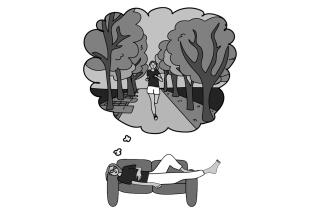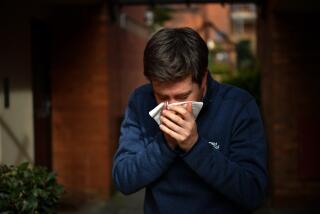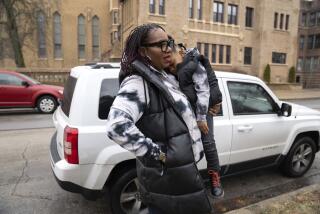Flu brings a culture of denial to its knees
- Share via
The office of Descanso Pediatrics in La Canada is divided into two sections marked by small white signs: Well and Sick. But when my little family and I staggered in last week, there were no seats in Sick, few enough in Well. “Sit anywhere,” the receptionist said. “Everyone is sick.”
The flu sweeping the U.S. arrived in Los Angeles about two weeks ago. And here were its refugees -- children crying and coughing and barfing, or even more frightening, lying limply across their parents’ laps. Unlike the magazine-leafing, cellphone-using moms one usually encounters in the pediatrician’s offices, these folks were as dazed and red-eyed as their children. They weren’t here for shots or checkups or forms for camp; they were here because they were worried, even scared.
Children die during flu season; you see the stories in the papers and you wonder how such a thing happens until your normally irrepressible daughter neither eats nor drinks for five straight days and just lies there coughing and glassy-eyed on the couch like Beth March right before the angels come.
So I called the pediatrician, even though years of having my fears dismissed over the phone (“Teething, colic, head bursting into flames? What is he -- about 9 months old? Perfectly normal, give him some Tylenol.”) has trained me not to do this. The very nice doctor who was up to her elbows in worried parents and flu cases -- “On Monday, we stopped counting at 150,” she said -- told me to come in, looked at both kids, diagnosed the flu and, in my daughter’s case, a double ear infection, and informed us it is not unusual for children to have fever for five to seven days.
And so we entered the parallel dimension of lingering illness.
It is fitting that the flu should hit L.A. only after visiting other major cities because this is a city with practically no bedside manner. Illness is not part of our buffed-out beach and mountain self-image, and we just don’t know what to do with it.
Here artistic merit has no history of hacking away in some tubercular garret; few screenwriting or directing careers emerged from a bedridden childhood. The L.A. body is not just a temple, it is a religion, and the reaction to sickness predictably Calvinistic -- what, did you forget to get a flu shot? To get a colonic and take your C? Were you too cheap to add that power shot to your smoothie?
Even the weather conspires to make those with seasonal ailments look silly--it seems impossible that anyone could have the flu when it is 65 degrees and sunny outside.
Here the culture of illness is defined by denial and avoidance. Stories of famous powerful Hollywood types hiding various illnesses for fear of losing clout abound, and the best a flu victim can hope for really is arm’s length sympathy and a “well, call me when you/they’re better.”
In the week spent moving the children from bed to couch and back again, the days separated into two sets of time. Outside time continued to move by in hours fleet and full of work and errands and things to do; inside it was measured out in Eliot’s coffee spoons, in this case full of cough syrup and chicken soup and Sprite.
All reports of this flu proved true -- it is harsh and unrelenting and there was nothing to do but sit with my children, trying to comfort them, by turns frustrated by my inability to make them feel better and bored, then appalled at my boredom. I was out of my element; the only real exposure I’ve had to a sickroom like this has been through literature.
In Dickens, Alcott, even Austen, people are always getting sick like this -- long illness was so inevitable it was used as a standard plot device for newfound intimacy and/or personal transcendence. Entire casts of characters gathered in one sickroom or another, either wringing their hands with worry until the fever passed or cheering the invalid’s convalescence with flowers and home-written poetry.
Modern narrative still deals with illness, but usually only the biggies, such as cancer or AIDS. In this country, modern medicine has eradicated many mortal diseases and decreased fatality from things like pneumonia, typhoid and influenza. Now most of our dealings with illness are short-lived, more inconvenient than life-changing, and so our relationship to the sickroom has changed. We might visit a friend in the hospital, but probably not one simply recuperating from the flu. Illness, even when part of an epidemic, has become a private affair with few social mores or rituals around it. No flowers. No poetry.
“Feel better,” people are commanded when they call in sick or cancel an outing. “Take care of yourself.”
Literally.
But children can’t take care of themselves, and the hardest thing about this flu is that there is no cure but time. Weird, fever-dream-filled-sickroom time. That sees the outside world as if through a curtain, like a pale child at the window watching his friends throwing snowballs on a winter’s day.



